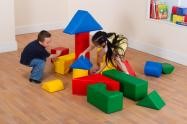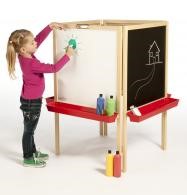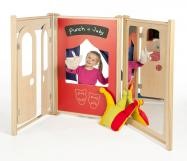We all know that play is fun but when children are playing they are also learning all sorts of skills, and carrying out other tasks, which will set them up for life. Play is an essential tool in a child’s development and should not be underestimated.
Here are just a few reasons how play can benefit learning:
- Social and communication skills
From the age of about two to three children start to play together and interact with each other. This helps them to learn and develop communication skills such as speech, language and listening skills. It also helps them develop other social skills including sharing, co-operation, compromising and taking turns. By playing together children learn about real life relationships and learn to negotiate and handle conflicts.
Physical play will help children develop all sorts of motor skills – from running, jumping, throwing, balance, strength and flexibility. The will also develop fine motor skills such as dexterity and hand-eye co-ordination.
For example, building a tower using blocks will improve the way a child uses their hands and fingers and their hand-eye co-ordination.
Physical play also helps children work through stresses – they have time to work off energy and relax in order to prevent grumpiness and tension. Physical play also encourages children to get active and adopt a healthy lifestyle – something that should stay with them for life.
Our range of soft play equipment and building blocks encourages physical play.

How many times have you played the same thing with a toddler, over and over again? Or watched a pre-schooler repeat the same action or task? They enjoy the repetition but they are also learning. A young child will often become absorbed in the same play activity and this will help build up and improve levels of concentration.

If children have the space and tools to be artistic or imaginative, this will encourage their creativity. Activities such as messy play, sand and water play, drawing, painting and mark making will all help.
Our range of junior easels is ideal for all sorts of creative play from painting to drawing and games.
Pretend play helps build the imagination. Encourage children to play with things in a different way or give ideas for what items could be. For example, a block is not just a block, it could be a car or an aeroplane or a house. With a little imagination, a child can have endless fun with the simplest of objects.
Role play is another way to build imagination. Children can take on roles and act out scenarios that are familiar to them. Our role play panels are a great resource for imaginative play as they are available in lots of different themes.

Play can also help with emotional development as children use play as a way to express emotions and feelings. It can help children interpret issues they are finding difficult. Children will often use play to act out what they know and what they see to help them understand situations. They can use role play as a way to practice being in different scenarios.
Play will give a child a sense of their own ability. Overcoming challenges during play will give them a sense of achievement and increase their self-esteem.
At Early Learning Furniture we provide educational furniture and equipment to schools, nurseries and pre-school. For more information on our school play equipment or any of our product ranges, please contact us or call our sales team on 01733 511121.
Permalink:
https://www.earlylearningfurniture.co.uk/blog/how-play-can-benefit-learning.aspx